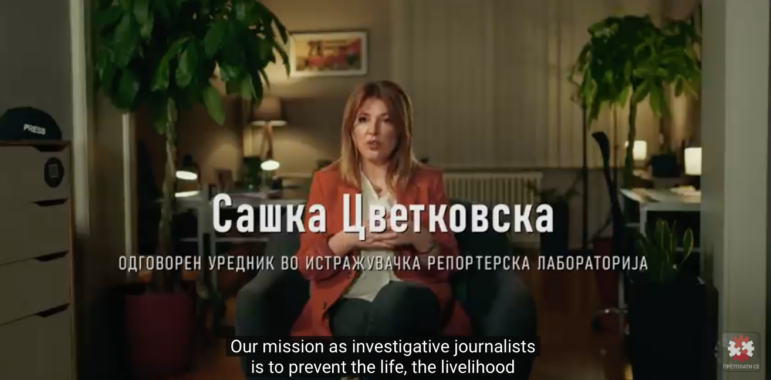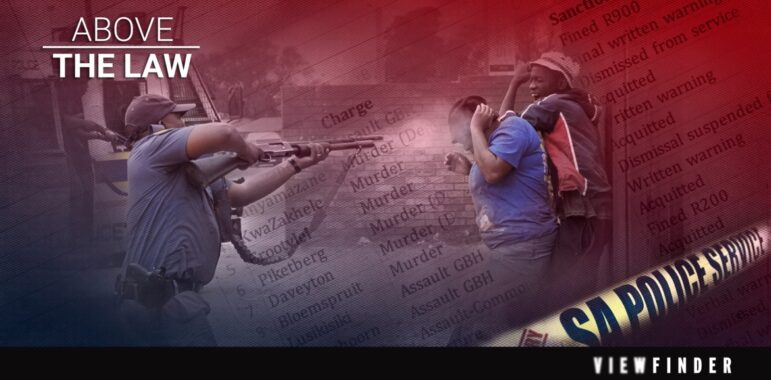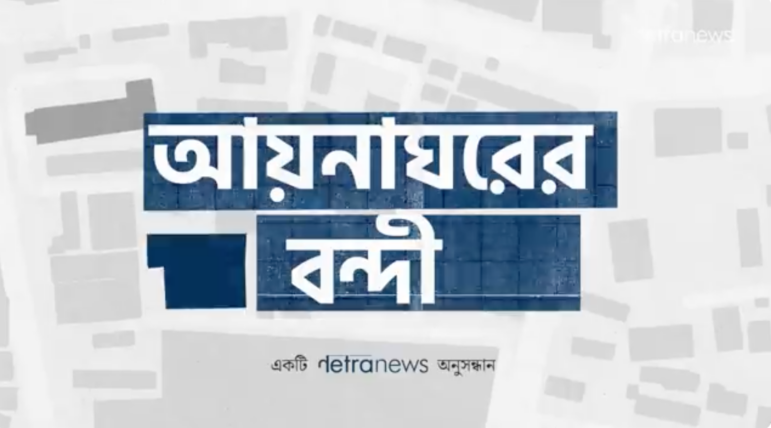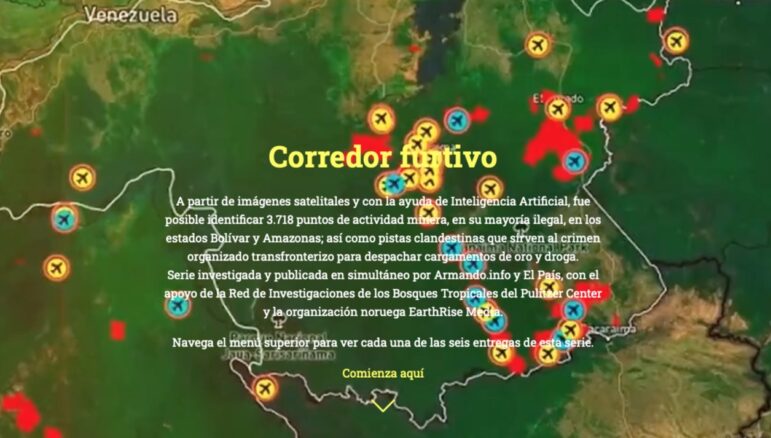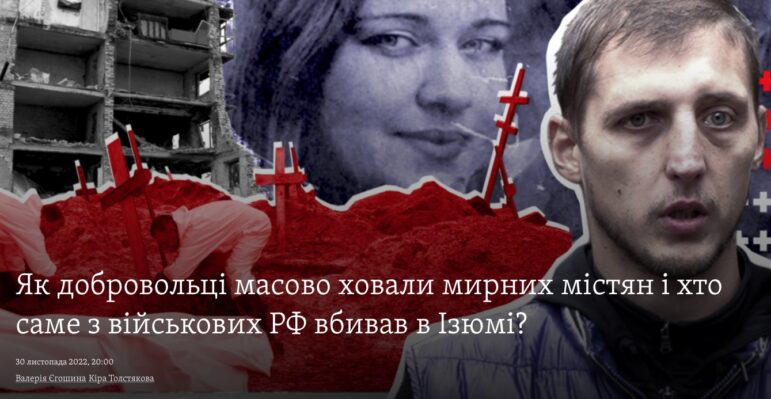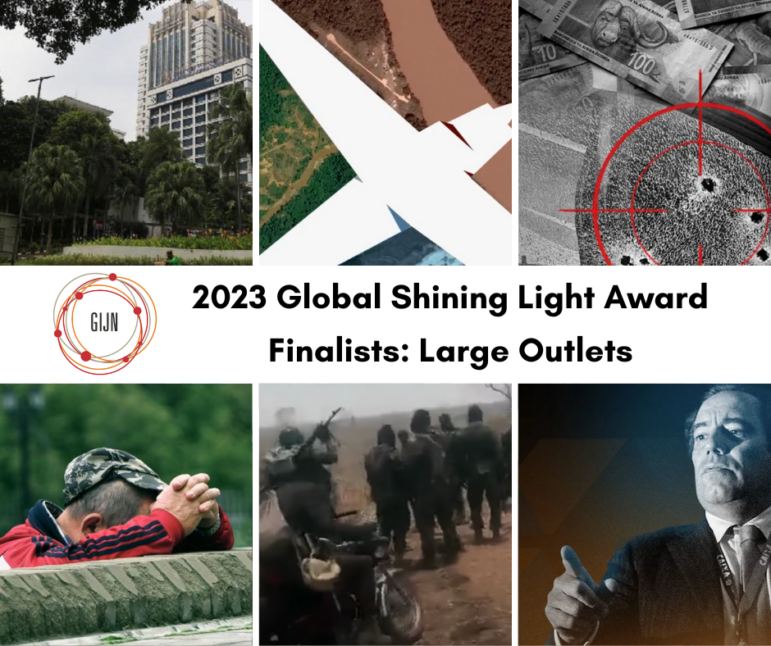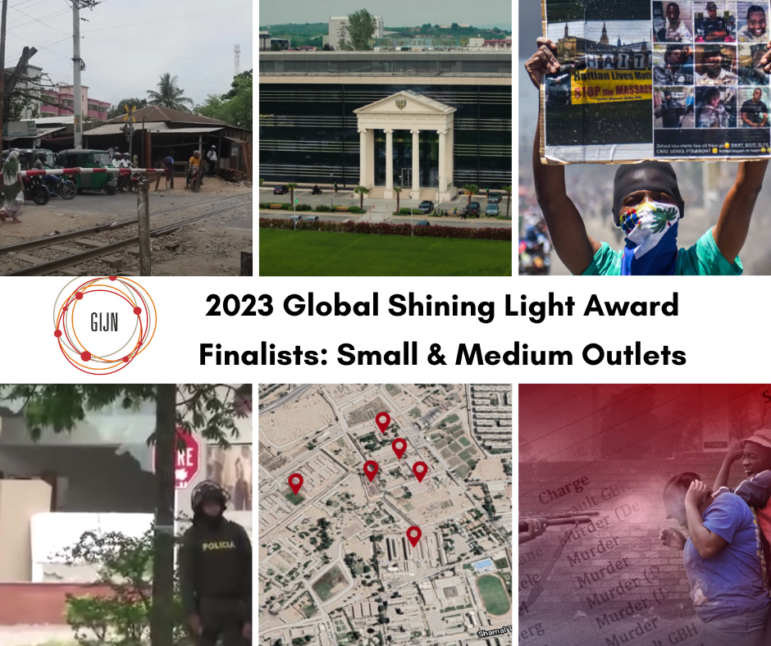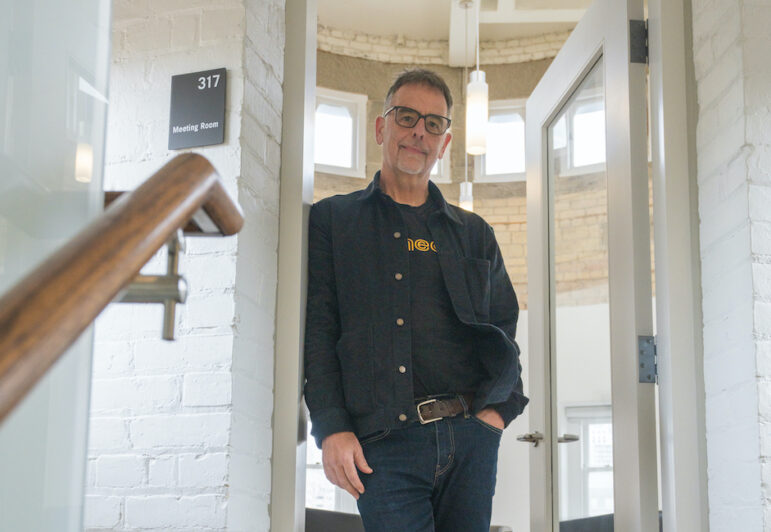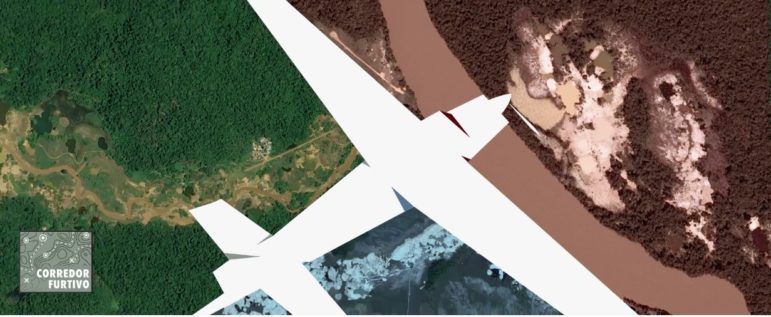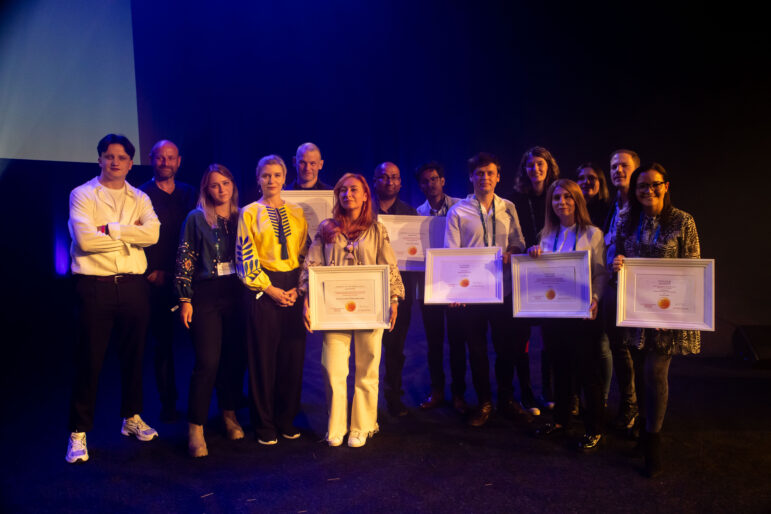

The 2023 Global Shining Light Award winners and honorees. Image: Leonardo Peralta for GIJN
Investigations from Nigeria, Venezuela, South Africa, and North Macedonia Win Global Shining Light Awards at GIJC23
Stories on illegal mining in Venezuela, systemic banditry in northwestern Nigeria, police brutality in South Africa, and COVID-19 profiteering in North Macedonia won Global Shining Light Awards (GSLA) at the 13th Global Investigative Journalism Conference (#GIJC23).
The prize honors watchdog journalism in developing or transitioning countries, carried out under threat or in perilous conditions. Open to stories published or broadcast in 2021 and 2022, entries featuring courage and investigative impact in these hostile press environments were so numerous that the awards jury chose to award certificates of excellence to two additional projects: a story on a secret prison in Bangladesh, and an investigation into mass graves in Ukraine.
Joint winners announced in the Small and Medium Outlets category (for organizations with staff of 20 or less, including freelancers) were Bad Blood, by the Investigative Reporting Lab (North Macedonia), and Above the Law, by Viewfinder (South Africa). Joint winners for Large Outlets were The Bandit Warlords of Zamfara, by BBC Africa Eye (Nigeria), and Corredor Furtivo, by Armando.Info (Venezuela) and El País (Spain). GSLA Certificates of Excellence were awarded to How Volunteers Buried Civilians en Masse in Izium, by Radio Liberty/Schemes (Ukraine) and Secret Prisoners of Dhaka, by Netra News (Bangladesh).
The biennial winners were announced at a gala awards event on Thursday, Sept. 21, at GIJC23 in Gothenburg, Sweden. Awardees were congratulated by outgoing GIJN Executive Director David E. Kaplan and GIJN Deputy Director Gabriela Manuli.
In total, the 2023 Global Shining Light Awards competition attracted a record 419 applications from 84 countries. The judging panel chose the four GSLA winners and two certificate awardees from a dozen finalists from 11 countries, across the two categories. Winners will each receive a plaque and US$2,500; Certificate awardees will receive a plaque and US$1,000.
On the jury were veteran investigative editors representing five global regions: Sheila Coronel, investigative journalism professor at the Graduate School of Journalism at Columbia University; the Guardian’s former investigative editor David Leigh; GIJN Africa Editor Benon Oluka; noted Mexican journalist Marcela Turati; and Ukrainian media development trainer Oleg Khomenok.
“The winners of the Global Shining Light Awards renew our faith that the muckraking tradition remains alive, even in the most dangerous and inhospitable places,” noted Coronel, chair of the judging panel. “It is a dangerous time to be an investigative journalist and our winners have shown that with courage, skill, and the support of citizens, groundbreaking and high-impact reporting is possible despite the risks. We salute this year’s awardees. They are an inspiration to all of us.”
GIJN’s Kaplan agreed. “Despite all the obstacles thrown at the world’s watchdog journalists, our colleagues are doing extraordinary work, even under the most arduous conditions,” he said. “What these impressive projects show is that not only is investigative journalism refusing to go away – we are growing and shining more light in some of the world’s toughest places.”
This year’s award-winning teams focused on issues such as violence perpetrated with impunity, the exploitation of COVID-19 patients, and hidden environmental abuses — and pursued them often under severe threat.
Notably, the winning investigations showed a wide variety of digging methodologies, from advanced data mapping by Armando.Info and dogged document work by the Investigative Reporting Lab to solo, seat-of-the-pants militia interviews by a freelancer for BBC Africa Eye, using an off-road motorcycle for access.
Small Outlets Category
Joint Winners
Bad Blood — Investigative Reporting Lab (North Macedonia)
Team: Sashka Cvetkovska, Elena Mitrevska Cuckovska, Maja Jovanovska, Dajana Lazarevska, Lila Karatasheva, David Ilieski, Trifun Sitnikovski, Trajche Antonovski, Atanas Velkovski, Gorjan Atanasov, Mladen Pavleski, Vlatko Vladimirov, Luka Blazev, Denica Chadikovska, Martina Siljanovska, Sergej Sarchevski, Bojan Stojanovski, Aleksandra Denkovska, and Ivana Nasteska.
In one of the most ambitious COVID-19 profiteering probes to emerge from the pandemic, an all-women reporting team decided to investigate coronavirus-related deaths, treatments, and patient billing at North Macedonia’s most prestigious private hospital. After months of investigations into several parallel angles, the Investigative Reporting Lab (a local member center of the Organized Crime and Corruption Reporting Project) found that the hospital had performed unsanctioned and unsafe blood purification treatments on numerous patients, while also concealing vital patient information and allegedly manipulating infection data. A striking feature of the effort was that these reporters were undeterred by the deep technical complexity of COVID-19 treatments, and a deluge of arcane medical spin from hospital executives. Reporters and a senior editor were assailed with pervasive online harassment, gendered smears, and death threats. Said one judge: “This story was impactful, and how they went about their reporting was dogged and systematic.” Another juror added: “I think some people didn’t take these reporters’ inquiries too seriously — and then they nailed it!”
Above the Law — Viewfinder (South Africa)
Reporter: Daneel Knoetze.
Like many classical investigative stories that achieve lasting impact, this piece makes institutional failure, rather than wrongs by individual officials, its central focus. This multi-year investigative series revealed a stunning lack of accountability for South African police officers implicated in crimes like rape, torture, assault, and even murder — as well as a system that enables rogue cops to reoffend. It also held individuals to account, despite the constant risk of reprisal. Remarkably, Viewfinder — a tiny nonprofit news organization — also created a unique, easily searchable public databaseof tens of thousands of registered complaints about police misconduct. Said one judge: “There was very intense reporting, and the storytelling is good, and, in every couple of sentences, you see a link to evidence the reporter provides — all kinds of documents.”
Certificate of Excellence
Secret Prisoners of Dhaka — Netra News (Bangladesh)
Team: Four journalists who cannot currently be named for safety reasons, along with Tasneem Khalil, Nazmul Ahasan, Zulkarnain Saer Khan, and David Bergman.
In a critical piece of watchdog journalism, Netra News — an exiled nonprofit newsroom for Bangladeshi audiences based in Sweden — revealed the existence of a secret detention center holding a wide range of dissidents and criminal suspects in the capital of Dhaka. This investigative documentary, which the outlet says has been viewed more than one million times, included testimony from former detainees, verification from current military officers, and photographs of the cramped and inhumane conditions inside. One panelist noted that Netra News “covers the untold stories in the country, and are always at risk from the authorities. This particular story exposed a ‘torture cell’ of the Bangladesh military which is, in any circumstances, the bravest example of Bangladeshi journalism.”
Large Outlets Category
Joint Winners
Corredor Furtivo (Furtive Corridor) — Armando.Info (Venezuela) and El País (Spain)
Team: Joseph Poliszuk, María de los Ángeles Ramírez, and María Antonieta Segovia.
This epic project involved sophisticated data mapping, innovative sourcing, and courageous field reporting to reveal a vast network of illegal mining operations in Venezuela and their corresponding threats to the environment and Indigenous communities. Published simultaneously by Armando.info and the Spanish daily El País, with support from the Pulitzer Center, the project mapped 3,718 illicit mining locations across an area twice the size of Germany, and also exposed routes used by cross-border organized crime gangs. The team used AI tools, databases, a satellite tracking program, and physical surveys of remote jungle routes to tell a story that also included powerful graphics. One jury member noted that “This story is taking us to where journalism is going — and it was a task so immense they used AI to crack the code of a story we would not otherwise have seen.” Another judge noted: “Yes, they used tools like AI, but there was also the threat of guerilla and narco gangs — so it was difficult and dangerous work; it was really brave.”
The Bandit Warlords of Zamfara — BBC Africa Eye (Nigeria)
Team: Yusuf Anka, Tom Saater, Jamil Mabai, Daniel Adamson, Kai Lawrence, Bulama Bukarti, Tom Roberts.
Every few years, a piece of journalism emerges that reveals an entire, largely hidden world — one that should deeply concern the world outside. In a two year-long investigation that involved stunning bravery, BBC Africa Eye exposed the pervasive conflict and banditry that has engulfed Nigeria’s northwestern state of Zamfara. For the first time, it also showed the motives and causes of a conflict that killed hundreds of people in 2022, and displaced hundreds of thousands more. The reporting centered on the unique access to warlords and victims gained by one reporter who traversed dangerous roads by motorcycle to conduct equally perilous interviews. According to BBC Africa Eye: “At huge personal risk, a young Nigerian journalist and law student, Yusuf Anka, visited bandit leaders in remote encampments across the state — including one of the men who, in February 2021, abducted nearly 300 girls from a high-school in Jangebe.” One Global Shining Light Award juror noted: “It’s a great piece of work, with the reporter going from one side to the other, giving us context — amazing.” Another panel member added: “He displayed extraordinary bravery in going to the heart of the conflict between ethnic groups in Nigeria, and was at the scene almost as soon as some of the events happened. He really took us to the heart of a story I haven’t seen anyone else tell.”
Certificate of Excellence
How Volunteers Buried Civilians en Masse in Izium — Radio Liberty/Schemes (Ukraine)
Team: Kira Tolstyakova, Valeriya Yegoshyna, Nataliya Sedletska, Kyrylo Lazarevych, Pavlo Melnyk, Maksym Asyka, Heorhii Shabaiev, and Anna Peterimova.
Schemes, an investigative project of Radio Liberty’s Ukraine service, submitted a number of excellent stories on suspected Russian war crimes for the Global Shining Light Award, all of which were produced under harrowing conditions. For a finalist spot, the jury chose one Schemes story that not only exposed the origins of mass graves in the Kharkiv region, but also found evidence of civilian torture, and identified the overlapping Russian occupation brigades behind these systematic human rights abuses. The reporters even unearthed conversations in which Russian soldiers discussed their crimes. While the team used documents and open source tools, this emotionally powerful story revolved around interviews with volunteers who had to bury hundreds of fellow Ukrainians. One jury member noted: “This story really showed the drama of the murder of civilians, which is important. This is a group of reporters who worked as a single newsroom — assigned to report parts of de-occupied Ukraine — and they revealed crimes and even the Russian military units involved.”
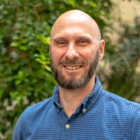 Rowan Philp is a reporter for GIJN. He was formerly chief reporter for South Africa’s Sunday Times. As a foreign correspondent, he has reported on news, politics, corruption, and conflict from more than two dozen countries around the world.
Rowan Philp is a reporter for GIJN. He was formerly chief reporter for South Africa’s Sunday Times. As a foreign correspondent, he has reported on news, politics, corruption, and conflict from more than two dozen countries around the world.





